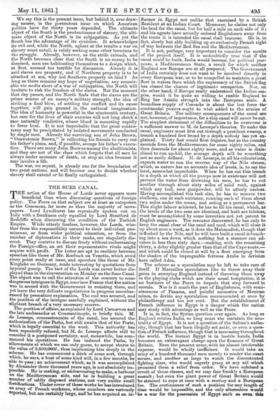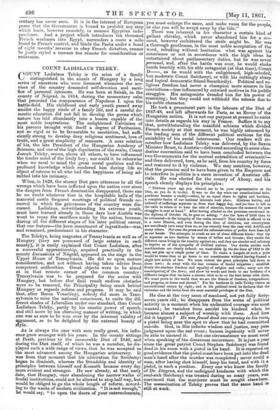THE SUEZ CANAL.
ririE action of the House of Lords never appears more beneficial than when discussing questions of foreign .policy. The Peers on that subject are at least as outspoken as the Commons, far more so than the majority of news- papers. Lord Lyndhurst has repeatedly spoken out on Italy with a frankness only equalled by Lord Stratford de Redcliffe when discussing the condition of the Turkish Empire. While utterly fearless, however, the Lords, whe- ther from the, responsibility natural to their individual pro- minence, or from wider political education, or 'from the number of diplomatists in their ranks, are singnlnrly dis- ereet. They contrive to discuss freely without embarrassing the Foreign-office, an art their representative rivals might acquire with profit. The latter are apt to oscillate between speeches like those of Mr. Roebuck on Venetia, which avoid every point really at issue, and speeches like those of Mr. Kinglake on Germany, made interesting by quotations from imperial gossip. The tact of the Lords was never better dis- played than in the Conversation on Monday on the Suez Canal. The object was to call the attention of the country to some dangerous intrigues in Egypt, convince France that the nation was in accord with the Government in resisting them, and yet leave the very delicate negotiations in progress unembar- -rassed by premature explanation. The, end was secured, and the position of the intrigue carefully explained, without the slightest breach of a very necessary reserve. The position of affairs, as explained by Lord Carnarvon and the late ambassador at Constantinople, is briefly this. M. .de Lesseps, coneessionnaire of the canal, has secured the authorization of the Pasha, but still awaits that of the Porte, which is legally essential to the work. This authority has been repeatedly refused, but M. de Lesseps affects still to consider it a postponed certainty, and, •meanwhile, has coin= meneed his operations. He has induced the Pasha, by allurements at which we can only guess, to accept shares to the value of 3,500,0001., thus implicating him deeply in the scheme. He has commenced a ditch of some sort, through which, he says, a boat of some kind will, in a few months, be able to pass ; an achievement which, as it was accomplished by Alexander three thousand years ago, is not absolutely im- possible. He is making, or endeavouring to make, a harbour on the Mediterranean -side, and he is building a great number of oddly disposed stations, not very unlike small -fortification& Under cover of these works he has introduced. an army of French workmen, whose numbers are variously reported, but are eertainly'large, andle has acquired an in- fluence in Egypt not unlike that exercised by a British Resident at an Court. Moreover, he claims not only the land for the canal, but for half a mile on each side of it; and his agents have actually ordered Englishmen away from the route it is intended the canal shall traverse. He is, in fact, slowly but ably building up an exclusively French right of way between the Red Sea and the Mediterranean. It is not, perhaps, very important to consider the merits of the project itself. It is undoubtedly true that if the canal could be built, India would become, for political pur- poses, a Mediterranean State, a result for which neither England nor Europe are at all prepared. TheGovernment of India certainly does not want to be involved directly in every European war, or to be compelled to maintain a great fleet in waters from which the supremacy of the British flag has chased the chance of legitimate occupation. Nor, on the other hand, if Europe really understood the Indian em- pire, would it be quite so willing to enable England to fling her Asiatic strength into the European scale. A. boundless supply of Cossacks is about the last force the continental powers ought to wish added to the armies of Great Britain. The military consequences of the canal are not, however, of importance, for a ship canal will never be cut. The simplest statement of the difficulties to be overcome is a sufficient answer to M. de Lesseps's theories. To make the canal, engineers must first cut through a pestilent swamp, a trench a hundred feet broad by a depth nobody has yet etc- plained. Thirty feet would float frigates, but as the country ascends from the Mediterranean for some eighty miles, and then descends for about eighty more, and as water is disin- clined to run up-hill, the average depth will be something not so easily defined. M. de Lesseps, in all his calculations, expects water to run the reverse way of the Nile stream, which, as nature has an accurate idea of levels, is, to say the least, somewhat improbable. When he has cut this trench to a depth at which all the pumps now in existence Will net prevent the water from drowning his men, he has to cut another through about sixty miles of solid rock, against which any tool, save gunpowder, will be utterly useless. Having accomplished this task also, he has to remove two shallows, one at each entrance, running each of them about two miles.under the ocean, and acting as a permanent bar. This slight labour achieved, he has to fill his canal, which, as the levels of the two seas are identical, and both are tideless, must be accomplished by some invention not yet patent to English engineers. The resource discovered, he has only to keep the canal clear of the sand and, mud, which will close it up about once a week, as it does the Mahmudieh, though that is flushed by the Nile, and he will have built a canal debouch- ing into a sea down which nothing but a steamer can ad- vance in less than sixty days,—making, with the remaining thirty, a delay slightly greater than that of the Cape route,— and which could be closed at will by a fleet emerging from the shadow of the impregnable fortress Arabs in derision have called Aden.
The scheme as a speculation may be left to take care of itself. If Marseilles speculators like to throw away their gains in annoying England instead of throwing them away in the playing clubs which are their usual temptation, it us no business of the Peers to impede that step forward in morale. Nor is it much the part of Englishmen, with remi- niscences of Panama, and painful memories of Mexican mines, to deride any speculation recommended at once by philanthropy and ten per cent. But the establishment of French influence in Egypt is a danger which the nation may study with advantage as well as the Peers. It is, in fact, the Syrian question over again. As long as England. retains India, so long must she maintain the neu- trality of Egypt. It is not a question of the Sultan's autho- rity, though that has been illegally set aside, or even a on of French influence, though that is increasingthrougroZ ti the world. The instant Egypt is in hostile hands, India becomes an extravagant charge upon the finances of Great Britain. Even the present army, with its almost intolerable expense, would be wholly inefficient. It would take an army of a hundred thousand men merely to render the coast secure, and another as large to watch the discontented fighting class, who would eagerly grasp at any aid which promised them a relief from order. We have subdued a revolt of those classes, and we may face frankly a European assault ; but even the giant power of Great Britain would be strained to cope at once with a mutiny and a European foe. The continuance of such a position for any length of time would be impossible, and the only alternative would be a war for the possession of Egypt such as even this century has never seen. It is in the interest of European peace that the Government is bound to prohibit any step which leads, however remotely, to menace Egyptian inde- pendence. And a project which introduces ten thousand i French workmen into Egypt, surrenders a route a mile broad to French control, and binds the Pasha under a bond of eight months' revenue to obey French dictation, cannot be justly styled a menace too remote for consideration or resistance.































 Previous page
Previous page